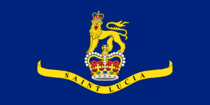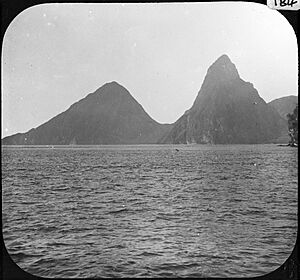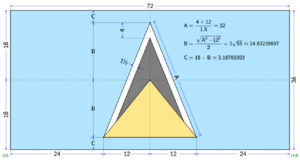Flag of Saint Lucia facts for kids
 |
|
| Use | National flag and ensign |
|---|---|
| Proportion | 1:2 |
| Adopted | 1 March 1967 (last modified in 2002) |
| Design | A light blue field with a small golden isosceles triangle in front of a large white-edged black isosceles triangle in the centre. |
| Designed by | Dunstan St Omer |

Standard of the governor-general of Saint Lucia
|
|
| Proportion | 1:2 |
| Adopted | 1979 |
The national flag of Saint Lucia is a bright blue flag with a special design in the middle. This design features a golden triangle placed in front of a black triangle that has white edges.
This flag was first used in 1967. It replaced an older flag from when Saint Lucia was a British colony. The new flag was adopted when Saint Lucia became an "associated state" of the United Kingdom. This meant it had more control over its own matters. While the main look of the flag has stayed the same, some small changes have been made over the years.
Contents
The Flag's Story: A Look Back in Time
Saint Lucia has a long history with both France and Britain. France first settled the island in 1635. For many years, France and Britain fought over who would control Saint Lucia. The island changed hands many times!
Finally, in 1814, a peace agreement called the Treaty of Paris was signed. This treaty made Saint Lucia a permanent British colony. During these early years, Saint Lucia did not have its own unique flag. It used the flags of its rulers, either France or Britain.
Saint Lucia Gets Its First Unique Flag
In August 1939, Britain gave Saint Lucia its very own coat of arms. This special symbol was a black shield with two bamboo sticks forming a cross. In the four sections of the shield, there were two Tudor roses, which stood for England, and two fleurs-de-lis, which stood for France.
This new coat of arms was then added to the British Blue Ensign flag. This created Saint Lucia's first unique colonial flag.
Becoming an Associated State and Independence
From 1958 to 1962, Saint Lucia was part of a group called the West Indies Federation. This group didn't last long.
On March 1, 1967, Saint Lucia became an "Associated State." This was a big step! It meant Saint Lucia could manage its own local affairs, while Britain still handled things like foreign policy and defense. On this important day, Saint Lucia adopted its new flag. This flag was designed by a talented artist from Saint Lucia named Dunstan St Omer.
Later, on February 22, 1979, Saint Lucia became a fully independent country! The flag's main design stayed the same, but the shade of blue and the size of the triangles were changed slightly. Even though Saint Lucia had its own flag, the British flag (the Union Jack) was lowered for the last time at the independence ceremony.
What the Flag's Design Means
Every color and shape on the flag of Saint Lucia has a special meaning.
- Blue: The blue color represents the beautiful sky and the surrounding waters. Saint Lucia is an island, so it's surrounded by the Atlantic Ocean and the Caribbean Sea.
- Black and White: The black and white colors stand for the peaceful relationship and harmony between people of different backgrounds in Saint Lucia.
- Yellow: The bright yellow color symbolizes the warm sunshine that blesses the island. It also represents prosperity and a bright future for the country.
- Triangles: The triangles on the flag are very important. They represent the Pitons, which are two famous volcanic mountains on the island. These mountains, called Gros Piton and Petit Piton, are a national symbol of Saint Lucia. The triangles also stand for unity and strength.
Past Flags of Saint Lucia
Saint Lucia has had several flags throughout its history, reflecting its journey through different periods of rule and self-governance. Here are some of them:
| Flag | Years Used | What it was used for | Description |
|---|---|---|---|
 |
1766–1796 | Flag of the French Colony of Saint Lucia | This flag had a white cross on a blue background. In each corner, there was an L-shaped snake, representing "Lucia." |
 |
1796–1801 | Flag of the United Kingdom | After Britain took control, this flag, known as the "Kings Colours," became the official flag. |
 |
1801–1875 | Flag of the United Kingdom | The famous Union Jack was updated in 1801 to include the St. Patrick's cross. This was the island's official flag until it got its own colonial flag. |
 |
1875–1939 | Flag of the British Colony of Saint Lucia | This flag included a special Latin motto that means, "Hardly a faithless guard for ships." |
 |
1875–1939 | Flag of the governor of Saint Lucia | This was the Union Jack with Saint Lucia's 1875 coat of arms in the middle, surrounded by a wreath. |
 |
1939–1967 | Flag of the British Colony of Saint Lucia | This was a British Blue Ensign with the 1939 coat of arms. The coat of arms had bamboo, Tudor roses for England, and fleurs-de-lis for France. |
 |
1939–1979 | Flag of the governor of Saint Lucia | This flag was the Union Jack with a white circle in the center containing the 1939 coat of arms, surrounded by a wreath. |
 |
1967–1979 | Flag of Saint Lucia | This version had a cerulean blue background with a yellow triangle in front of a black arrowhead shape. |
 |
1979–2002 | Flag of Saint Lucia | This flag was similar to the 1967 version, but the yellow triangle was made larger and the black arrowhead was made thinner. |
See also
 In Spanish: Bandera de Santa Lucía para niños
In Spanish: Bandera de Santa Lucía para niños




